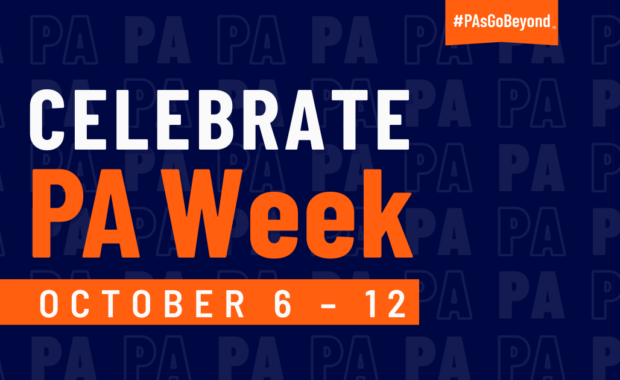Study Examines Impact of Depression on PA Professional Fulfillment
Increased Symptoms of Depression Related to Decreased Professional Fulfillment
September 27, 2021
By AAPA Research Department
In a new study1 found in the Journal of the American Academy of Physician Assistants (JAAPA), researchers from James Madison University in collaboration with AAPA examined the relationship between depression, anxiety, and professional fulfillment. The study, conducted in 2019 prior to the COVID-19 pandemic in conjunction with the 2019 AAPA Salary Survey, includes several important findings.
In 2018 6% of PAs had depression and 13% had moderate to severe anxiety
In the latter half of 2018, Medscape surveyed their member physicians about burnout, depression, and suicide. Of those, 4% of physicians were clinically depressed and an additional 11% were said that they felt down, blue, or sad according to a Medscape report.2 Looking at the general public, as of 2019, about 8% of adults in the US had a major depressive episode in the past year.3 Similarly, about 6% had moderate to severe anxiety in the 2 weeks prior to responding to the self-report instrument. Within the general public this varied by gender, with almost 8% of women have moderate to severe anxiety compared to 4% of men.4
Only 32% met criteria for professional fulfillment
Over half of the PAs (52.2%) within research had changed their specialty at some point in their career. With 48% extremely satisfied and 33% somewhat satisfied, that is 4 out of 5 PAs satisfied with their collaborating physician. Despite this, only 32% met the criteria for being professionally fulfilled.
One-third reported levels of burnout
Overall, approximately 34% of PAs met the cut off for burnout which is a composite of work exhaustion (46% met the cutoff) and interpersonal disengagement (30%). In the same year, the Medscape report found that 44% of physicians said that they were burned out.
Depression can negatively impact PAs’ feelings of professional fulfillment
There is a negative relationship between depression and professional fulfillment so that that the greater a PA reports symptoms of depression, the lower the experiences of professional fulfillment. Critical to the findings is that levels of work exhaustion and interpersonal disengagement impact depression which then impacts professional fulfillment.
Depression can also increase medical errors
The researchers found that there is a moderately positive relationship between depression and medical errors so that the more depressed a PA is, the more they report making medical errors. Levels of burnout also impact this relationship. Overall, however, the self-reported medical errors were low. PAs were asked about 4 types of medical errors on a scale of 0 (Never) to 5 (in the last week) with a 3 being in the past three months). Out of 20 possible points, the average of was just 3.53. This is not unique to PAs.
On the original instrument development for the Professional Fulfillment Inventory (PFI), used in this research, their team found a positive relationship between depression and self-reported medical errors among physicians as well.5 In previous cited Medscape report, 14% of physicians who are depressed indicated that they make errors that they might not ordinally make and 26% are less motivated to be careful with taking patient notes.
Depression in clinicians can influence their work experiences such as professional fulfillment but so can feelings of burnout. Depression and burnout may also impact patient care, which is echoed in many studies, including those mentioned here. One of the takeaways from the present research is that it is important for society to understand that clinician mental health as well as burnout need to be addressed for the benefit of not just the clinicians but also of the patients.
Author
Noël Smith is AAPA’s senior director PA and industry research and analysis. Contact her at [email protected].
Additional Resources
PA Burnout
Blueprint for Addressing Physician Assistant Well-being and Burnout
References
- Blackstone SR, Johnson AK, Smith NE, McCall TC, Simmons WR, Skelly AW. Depression, burnout, and professional outcomes among PAs. JAAPA, 24(9): 43-49
- Medscape National Physician Burnout, Depression & Suicide Report 2019. https://www.medscape.com/slideshow/2019-lifestyle-burnout-depression-6011056.
- Substance Abuse and Mental Health Services Administration. (2020). Key substance use and mental health indicators in the United States: Results from the 2019 National Survey on Drug Use and Health (HHS Publication No. PEP20-07-01-001, NSDUH Series H-55). Rockville, MD: Center for Behavioral Health Statistics and Quality, Substance Abuse and Mental Health Services Administration. Retrieved from https://www.samhsa.gov/data/. https://www.samhsa.gov/data/sites/default/files/reports/rpt29393/2019NSDUHFFRPDFWHTML/2019NSDUHFFR1PDFW090120.pdf
- Terlizzi EP, Villarroel MA. Symptoms of generalized anxiety disorder among adults: United States, 2019. NCHS Data Brief, no 378. Hyattsville, MD: National Center for Health Statistics. 2020. Retrieved from https://www.cdc.gov/nchs/data/databriefs/db378-H.pdf.
- Trockel M, Bohman B, Lesure E, et al. A Brief Instrument to Assess Both Burnout and Professional Fulfillment in Physicians: Reliability and Validity, Including Correlation with Self-Reported Medical Errors, in a Sample of Resident and Practicing Physicians. Acad Psychiatry. 2018;42(1):11-24. doi:10.1007/s40596-017-0849-3
Thank you for reading AAPA’s News Central
You have 2 articles left this month. Create a free account to read more stories, or become a member for more access to exclusive benefits! Already have an account? Log in.



